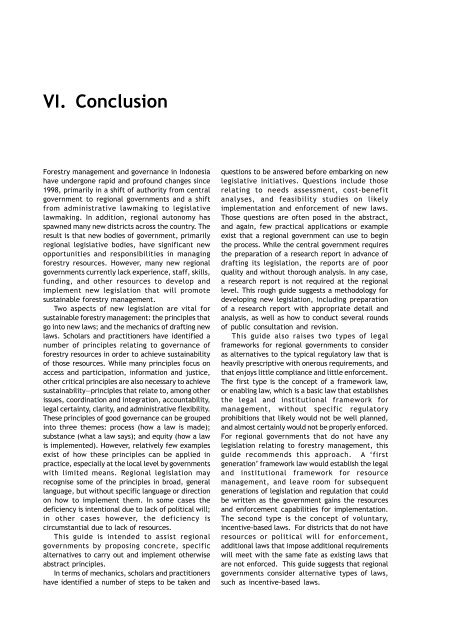A rough guide to developing laws for regional forest management
A rough guide to developing laws for regional forest management
A rough guide to developing laws for regional forest management
You also want an ePaper? Increase the reach of your titles
YUMPU automatically turns print PDFs into web optimized ePapers that Google loves.
VI. Conclusion<br />
Forestry <strong>management</strong> and governance in Indonesia<br />
have undergone rapid and profound changes since<br />
1998, primarily in a shift of authority from central<br />
government <strong>to</strong> <strong>regional</strong> governments and a shift<br />
from administrative lawmaking <strong>to</strong> legislative<br />
lawmaking. In addition, <strong>regional</strong> au<strong>to</strong>nomy has<br />
spawned many new districts across the country. The<br />
result is that new bodies of government, primarily<br />
<strong>regional</strong> legislative bodies, have significant new<br />
opportunities and responsibilities in managing<br />
<strong>for</strong>estry resources. However, many new <strong>regional</strong><br />
governments currently lack experience, staff, skills,<br />
funding, and other resources <strong>to</strong> develop and<br />
implement new legislation that will promote<br />
sustainable <strong>for</strong>estry <strong>management</strong>.<br />
Two aspects of new legislation are vital <strong>for</strong><br />
sustainable <strong>for</strong>estry <strong>management</strong>: the principles that<br />
go in<strong>to</strong> new <strong>laws</strong>; and the mechanics of drafting new<br />
<strong>laws</strong>. Scholars and practitioners have identified a<br />
number of principles relating <strong>to</strong> governance of<br />
<strong>for</strong>estry resources in order <strong>to</strong> achieve sustainability<br />
of those resources. While many principles focus on<br />
access and participation, in<strong>for</strong>mation and justice,<br />
other critical principles are also necessary <strong>to</strong> achieve<br />
sustainability—principles that relate <strong>to</strong>, among other<br />
issues, coordination and integration, accountability,<br />
legal certainty, clarity, and administrative flexibility.<br />
These principles of good governance can be grouped<br />
in<strong>to</strong> three themes: process (how a law is made);<br />
substance (what a law says); and equity (how a law<br />
is implemented). However, relatively few examples<br />
exist of how these principles can be applied in<br />
practice, especially at the local level by governments<br />
with limited means. Regional legislation may<br />
recognise some of the principles in broad, general<br />
language, but without specific language or direction<br />
on how <strong>to</strong> implement them. In some cases the<br />
deficiency is intentional due <strong>to</strong> lack of political will;<br />
in other cases however, the deficiency is<br />
circumstantial due <strong>to</strong> lack of resources.<br />
This <strong>guide</strong> is intended <strong>to</strong> assist <strong>regional</strong><br />
governments by proposing concrete, specific<br />
alternatives <strong>to</strong> carry out and implement otherwise<br />
abstract principles.<br />
In terms of mechanics, scholars and practitioners<br />
have identified a number of steps <strong>to</strong> be taken and<br />
questions <strong>to</strong> be answered be<strong>for</strong>e embarking on new<br />
legislative initiatives. Questions include those<br />
relating <strong>to</strong> needs assessment, cost-benefit<br />
analyses, and feasibility studies on likely<br />
implementation and en<strong>for</strong>cement of new <strong>laws</strong>.<br />
Those questions are often posed in the abstract,<br />
and again, few practical applications or example<br />
exist that a <strong>regional</strong> government can use <strong>to</strong> begin<br />
the process. While the central government requires<br />
the preparation of a research report in advance of<br />
drafting its legislation, the reports are of poor<br />
quality and without tho<strong>rough</strong> analysis. In any case,<br />
a research report is not required at the <strong>regional</strong><br />
level. This <strong>rough</strong> <strong>guide</strong> suggests a methodology <strong>for</strong><br />
<strong>developing</strong> new legislation, including preparation<br />
of a research report with appropriate detail and<br />
analysis, as well as how <strong>to</strong> conduct several rounds<br />
of public consultation and revision.<br />
This <strong>guide</strong> also raises two types of legal<br />
frameworks <strong>for</strong> <strong>regional</strong> governments <strong>to</strong> consider<br />
as alternatives <strong>to</strong> the typical regula<strong>to</strong>ry law that is<br />
heavily prescriptive with onerous requirements, and<br />
that enjoys little compliance and little en<strong>for</strong>cement.<br />
The first type is the concept of a framework law,<br />
or enabling law, which is a basic law that establishes<br />
the legal and institutional framework <strong>for</strong><br />
<strong>management</strong>, without specific regula<strong>to</strong>ry<br />
prohibitions that likely would not be well planned,<br />
and almost certainly would not be properly en<strong>for</strong>ced.<br />
For <strong>regional</strong> governments that do not have any<br />
legislation relating <strong>to</strong> <strong>for</strong>estry <strong>management</strong>, this<br />
<strong>guide</strong> recommends this approach. A ‘first<br />
generation’ framework law would establish the legal<br />
and institutional framework <strong>for</strong> resource<br />
<strong>management</strong>, and leave room <strong>for</strong> subsequent<br />
generations of legislation and regulation that could<br />
be written as the government gains the resources<br />
and en<strong>for</strong>cement capabilities <strong>for</strong> implementation.<br />
The second type is the concept of voluntary,<br />
incentive-based <strong>laws</strong>. For districts that do not have<br />
resources or political will <strong>for</strong> en<strong>for</strong>cement,<br />
additional <strong>laws</strong> that impose additional requirements<br />
will meet with the same fate as existing <strong>laws</strong> that<br />
are not en<strong>for</strong>ced. This <strong>guide</strong> suggests that <strong>regional</strong><br />
governments consider alternative types of <strong>laws</strong>,<br />
such as incentive-based <strong>laws</strong>.

















